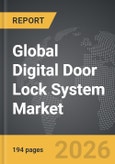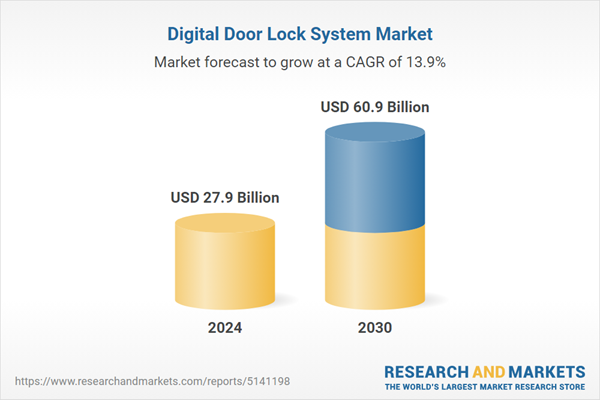Global Digital Door Lock System Market - Key Trends & Drivers Summarized
What Is Fueling the Expansion of Digital Door Lock Systems?
The market for digital door lock systems has witnessed significant growth over the past decade as home automation and smart security systems have become increasingly integrated into residential, commercial, and industrial applications. As security remains a primary concern for consumers, businesses, and governments alike, the demand for advanced door access solutions that go beyond traditional keys and locks has surged. Digital door lock systems, which use technologies like biometrics (fingerprint, retina scans), RFID, smart card access, and keypad codes, offer a more secure and convenient way to control access to buildings and spaces. The integration of these locks into wider home and office automation systems is becoming a common trend, as they provide an added layer of convenience through connectivity with mobile apps and smart home systems, allowing remote access and monitoring. The preference for smart home solutions among tech-savvy and security-conscious consumers is a significant factor propelling this market forward.How Are Technological Advances Shaping the Digital Door Lock System Market?
Advancements in technology have been pivotal in the evolution and growing popularity of digital door lock systems. The rapid development of Internet of Things (IoT) platforms and smart home ecosystems has enabled these systems to become a core part of a connected and automated lifestyle. Modern digital door locks now feature Wi-Fi and Bluetooth connectivity, integrating seamlessly with devices like smartphones, voice-activated assistants (such as Alexa or Google Assistant), and comprehensive home security systems. Additionally, the rising adoption of biometric technology has enhanced the security features of digital door locks, offering options such as facial recognition and vein authentication. These features provide a personalized security approach, reducing the chances of unauthorized access. The technological sophistication seen in these products not only boosts their market demand but also differentiates the products offered by various manufacturers, enabling them to create niche solutions tailored to residential, commercial, and institutional environments.What Are the Applications and End-Use Sectors of Digital Door Lock Systems?
The applications of digital door lock systems are diverse and span across multiple sectors. In the residential market, these locks are becoming an essential component of smart home security systems, appealing to homeowners seeking convenient and technologically advanced solutions. Commercial buildings, such as offices and retail spaces, utilize these systems to manage employee access, monitor entry points, and ensure building security around the clock. Similarly, the hospitality industry has increasingly adopted digital locks to enhance the guest experience by providing keyless entry options that integrate with hotel management systems, enhancing both convenience and security. In industrial and institutional settings, such as healthcare facilities, educational institutions, and government buildings, the demand for advanced access control systems has risen as organizations seek to secure sensitive areas and regulate movement efficiently. The versatility of these locks, capable of integrating with other building management systems, allows them to cater to a wide range of end-user needs, driving further market growth.What Are the Key Drivers Pushing the Growth of the Digital Door Lock System Market?
The growth in the digital door lock system market is driven by several factors, including technological advancements, increasing consumer demand for smart home solutions, and heightened security concerns across different sectors. The proliferation of IoT technology and smart devices has enabled the seamless integration of digital door locks into larger smart ecosystems, which is particularly attractive to consumers interested in home automation. Moreover, the rising focus on security within commercial and institutional spaces, influenced by increasing incidents of theft and security breaches, has led to greater investment in advanced digital security solutions. Biometric and facial recognition technologies have also gained popularity as they offer high accuracy and customization, providing an added layer of security that is appealing in both residential and corporate settings. The expanding construction of smart buildings and smart cities globally, particularly in developing regions, has further fueled the demand for these systems, as they are often considered standard in modern architectural designs. Furthermore, consumer behavior trends indicate a growing preference for contactless solutions, especially post-pandemic, where hygiene and convenience are prioritized, enhancing the market's growth trajectory.Report Scope
The report analyzes the Digital Door Lock System market, presented in terms of market value (US$ Thousand). The analysis covers the key segments and geographic regions outlined below.- Segments: Type (Keypad Locks, Biometrics Locks, RFID Card Digital Locks, Keyless Remote Locks); End-Use (Commercial, Residential, Government, Industrial).
- Geographic Regions/Countries:World; United States; Canada; Japan; China; Europe (France; Germany; Italy; United Kingdom; and Rest of Europe); Asia-Pacific; Rest of World.
Key Insights:
- Market Growth: Understand the significant growth trajectory of the Keypad Locks segment, which is expected to reach US$26.7 Billion by 2030 with a CAGR of a 13.7%. The Biometrics Locks segment is also set to grow at 14.9% CAGR over the analysis period.
- Regional Analysis: Gain insights into the U.S. market, valued at $7.5 Billion in 2024, and China, forecasted to grow at an impressive 12.7% CAGR to reach $9.2 Billion by 2030. Discover growth trends in other key regions, including Japan, Canada, Germany, and the Asia-Pacific.
Why You Should Buy This Report:
- Detailed Market Analysis: Access a thorough analysis of the Global Digital Door Lock System Market, covering all major geographic regions and market segments.
- Competitive Insights: Get an overview of the competitive landscape, including the market presence of major players across different geographies.
- Future Trends and Drivers: Understand the key trends and drivers shaping the future of the Global Digital Door Lock System Market.
- Actionable Insights: Benefit from actionable insights that can help you identify new revenue opportunities and make strategic business decisions.
Key Questions Answered:
- How is the Global Digital Door Lock System Market expected to evolve by 2030?
- What are the main drivers and restraints affecting the market?
- Which market segments will grow the most over the forecast period?
- How will market shares for different regions and segments change by 2030?
- Who are the leading players in the market, and what are their prospects?
Report Features:
- Comprehensive Market Data: Independent analysis of annual sales and market forecasts in US$ Million from 2024 to 2030.
- In-Depth Regional Analysis: Detailed insights into key markets, including the U.S., China, Japan, Canada, Europe, Asia-Pacific, Latin America, Middle East, and Africa.
- Company Profiles: Coverage of players such as ADT Inc. (dba ADT Security Services, Inc.), Allegion PLC, Assa Abloy AB, August Home, Cisco Systems, Inc. and more.
- Complimentary Updates: Receive free report updates for one year to keep you informed of the latest market developments.
Some of the 42 companies featured in this Digital Door Lock System market report include:
- ADT Inc. (dba ADT Security Services, Inc.)
- Allegion PLC
- Assa Abloy AB
- August Home
- Cisco Systems, Inc.
- Godrej & Boyce Manufacturing Co., Ltd.
- Honeywell International, Inc.
- Johnson Controls, Inc.
- Onity, Inc.
- Panasonic Corporation
- Vivint, Inc.
This edition integrates the latest global trade and economic shifts into comprehensive market analysis. Key updates include:
- Tariff and Trade Impact: Insights into global tariff negotiations across 180+ countries, with analysis of supply chain turbulence, sourcing disruptions, and geographic realignment. Special focus on 2025 as a pivotal year for trade tensions, including updated perspectives on the Trump-era tariffs.
- Adjusted Forecasts and Analytics: Revised global and regional market forecasts through 2030, incorporating tariff effects, economic uncertainty, and structural changes in globalization. Includes historical analysis from 2015 to 2023.
- Strategic Market Dynamics: Evaluation of revised market prospects, regional outlooks, and key economic indicators such as population and urbanization trends.
- Innovation & Technology Trends: Latest developments in product and process innovation, emerging technologies, and key industry drivers shaping the competitive landscape.
- Competitive Intelligence: Updated global market share estimates for 2025, competitive positioning of major players (Strong/Active/Niche/Trivial), and refined focus on leading global brands and core players.
- Expert Insight & Commentary: Strategic analysis from economists, trade experts, and domain specialists to contextualize market shifts and identify emerging opportunities.
Table of Contents
Companies Mentioned (Partial List)
A selection of companies mentioned in this report includes, but is not limited to:
- ADT Inc. (dba ADT Security Services, Inc.)
- Allegion PLC
- Assa Abloy AB
- August Home
- Cisco Systems, Inc.
- Godrej & Boyce Manufacturing Co., Ltd.
- Honeywell International, Inc.
- Johnson Controls, Inc.
- Onity, Inc.
- Panasonic Corporation
- Vivint, Inc.
Table Information
| Report Attribute | Details |
|---|---|
| No. of Pages | 194 |
| Published | February 2026 |
| Forecast Period | 2024 - 2030 |
| Estimated Market Value ( USD | $ 27.9 Billion |
| Forecasted Market Value ( USD | $ 60.9 Billion |
| Compound Annual Growth Rate | 13.9% |
| Regions Covered | Global |









